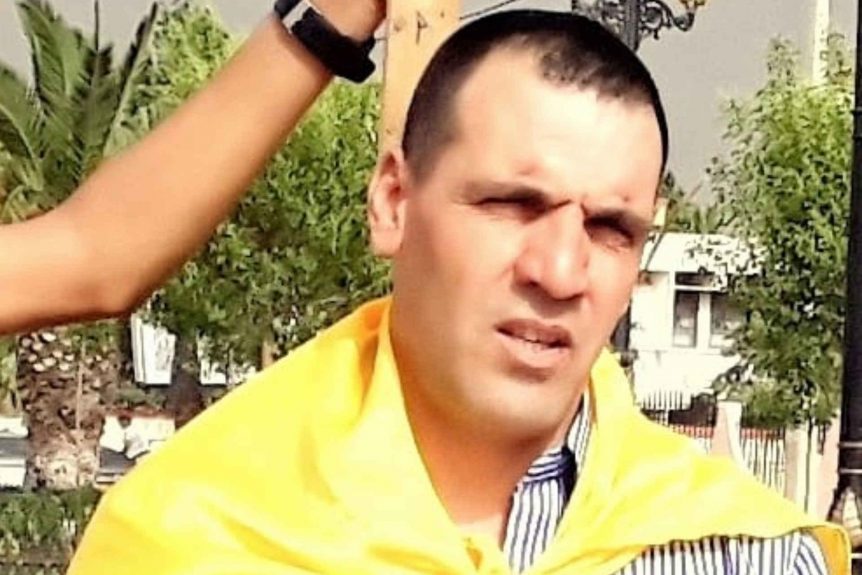On 11 November, the court of Khenchela (eastern Algeria) is expected to hear activist Yacine Mebarki’s appeal, following his sentencing on 8 October to 10 years in prison and a heavy fine of 10 million dinars (about 77,611.55 USD) – the most severe sentence ever handed to an activist for his online speech.
Algerian authorities should release Yacine Mebarki and drop unfounded charges related to his online publications and other charges that stem from the legitimate exercise of his freedom of speech and conscience, said the undersigned organisations. Authorities should put an end to criminal investigations and prosecutions against individuals for peacefully expressing their views, including views which may be critical of religious teachings and state officials.
Yacine Mebarki is a farmer from the town of Khenchela, known for his participation in the Hirak popular protest movement demanding radical political change in Algeria, and his engagement in the defense of Amazigh rights.
Police in Khenchela arrested Yacine Mebarki on 30 September, after a search of his home during which they discovered an old Quran belonging to Mebarki’s grand-father, which had a torn page, as well as two empty bullets. According to the activist’s lawyer, the bullets are the remains of old traditional celebrations involving gun-firing, prevalent in the Khenchela region and which are now used for decorative purposes.
The prosecutor of the Khenchela First Instance Court prosecuted Mebarki on the basis of social media publications, including a Facebook post from 17 February in which he appears to criticize Egyptian Salafi scholar Abu Ishaq al-Heweny for calling[1] for “jihad” against countries to take their “money, their children and their women”, as well as for the torn Quran and the bullets found in his house. During the trial, the judge also mentioned a Facebook post from 12 September in which Mebarki appeared to mock Algerian Minister of Justice Belkacem Zeghmati.
Mebarki was sentenced on 8 October to ten years in prison for “offense against the precepts of Islam” (Article 144bis 2 of the Penal Code); “profanation of the Sacred Book” (Article 160 of the Penal Code); “inciting to discrimination” (Article 295bis); “inciting a Muslim to convert to another religion” and “distribution of documents intended to undermine the faith of a Muslim” (Article 11 par. 1 and 2 of ordinance 06-03 setting the conditions and rules for the exercise of religions other than Islam). In addition, he was sentenced for “possession of war material without authorization” (Article 31 of ordinance 97-06 relating to war material, arms and ammunition), based on the discovery of the two bullets.
The above charges related to the activist’s freedom of speech and conscience are in violation of Algeria’s Constitution (article 42) and international human rights law, notably Article 19 of the International Covenant on Civil and Political Rights (ICCPR) ratified by Algeria. In an authoritative interpretation of the ICCPR from 2011, the United Nations Human Rights Committee noted that “the prohibition of displays of disrespect for a religion or any other belief system, including anti-blasphemy laws, is not compatible with the Covenant”. In October 2017, UN Experts also urged States “that still have blasphemy laws to repeal them because of their stifling impact on the enjoyment of the right to freedom of religion or belief, and on the ability to engage in a healthy dialogue about religion”.
This development is especially worrying as in recent months, in the context of the COVID-19 pandemic, authorities have accelerated the arbitrary prosecution of peaceful activists for expressing their opinion and journalists. As of 9 November and according to the National Committee for the Release of Detainees (CNLD), a local group monitoring Hirak trials, there are 87 prisoners of conscience in Algeria.
Signatories:
- Algerian League for the Defense of Human Rights
- Amnesty International
- Article 19
- Cairo Institute for Human Rights Studies
- CGATA (General Autonomous Confederation of Workers in Algeria)
- CIVICUS
- SNAPAP (Autonomous Union of Public Administration Personnel)
[1] Abu Ishaq al-Heweny later denied having made this declaration.
Share this Post

